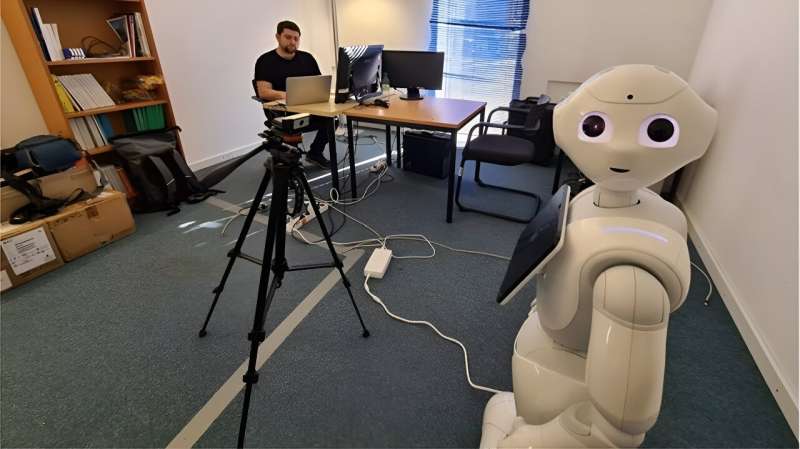This article has been reviewed according to Science X's editorial process and policies. Editors have highlighted the following attributes while ensuring the content's credibility:
fact-checked
trusted source
proofread
Social robots could be an effective tool to combat loneliness, according to study

People interacting with social robots disclosed more about themselves over time and reported feeling less lonely, according to a new study.
The research—led by the University of Glasgow and published in the International Journal of Social Robotics—also found that interacting with a social robot improved people's moods over time, suggesting social robots could be used as an effective intervention to support peoples' emotional health in the future.
The study aimed to examine the long-term, repeated use of social robots, examining people's continued engagement, particularly with peoples' self-disclosure, with such a novel concept. The research, which took place online during the peak of the pandemic, saw people introduced to social robot "Pepper" over Zoom video chats, 10 times over five weeks.
The study—which involved 39 people from across the U.K.—found that people disclosed more to the robot over time, speaking for longer durations and sharing more information. People also perceived the robot to be more social and competent as time progressed; and across the sessions with the robot, participants also found the robot's responses increasingly comforting, reporting mood improvements and a reduction in feelings of loneliness.
A secondary data analysis from this same study, published in the 2023 32nd IEEE International Conference on Robot and Human Interactive Communication (RO-MAN), revealed that individuals experiencing negative emotions (such as low mood, loneliness, and stress) and introverted individuals, as well as those who perceive the robot as more comforting, are more likely to open up and share more with robots.
Prof Emily Cross, Honorary Professor at the University of Glasgow, and a full Professor at ETH Zürich said, "We're really excited by the findings of our new study, which sets the stage for using social robots as conversation partners in future. While interactions with social robots are novel and exciting for many people, we were unsure to what extent people's engagement with them could be sustained over time.
"The results of our study suggest there are contexts in which people are willing to engage with these robots long-term, and social robots could be used as a tool to allow people to talk about themselves, to help support people's emotional health."
Dr. Guy Laban, Affiliated Research Associate at the University of Glasgow and Postdoctoral Research Associate at the University of Cambridge, said, "Our study lays the foundation for building relationships with robots, positioning them as valuable conversational partners, and providing crucial evidence for their potential inclusion in interventions supporting emotional health.
"It is exciting to see how this technology can be used for social good, providing meaning and a safe space to those in need. When conducting the experiment during the pandemic, we observed how a robot could lift people's mood amid very dark and isolated times.
"Considering the recent advances in AI (e.g., generative AI and Large language models, like GPT), studies like this are crucial. They help us better understand how humans establish healthy and constructive relationships with AI agents, such as robots, supporting the ethical and responsible deployment of this technology in the future."
More information: Guy Laban et al, Building Long-Term Human–Robot Relationships: Examining Disclosure, Perception and Well-Being Across Time, International Journal of Social Robotics (2023). DOI: 10.1007/s12369-023-01076-z
Guy Laban et al, Opening Up to Social Robots: How Emotions Drive Self-Disclosure Behavior, 2023 32nd IEEE International Conference on Robot and Human Interactive Communication (RO-MAN) (2023). DOI: 10.1109/RO-MAN57019.2023.10309551




















